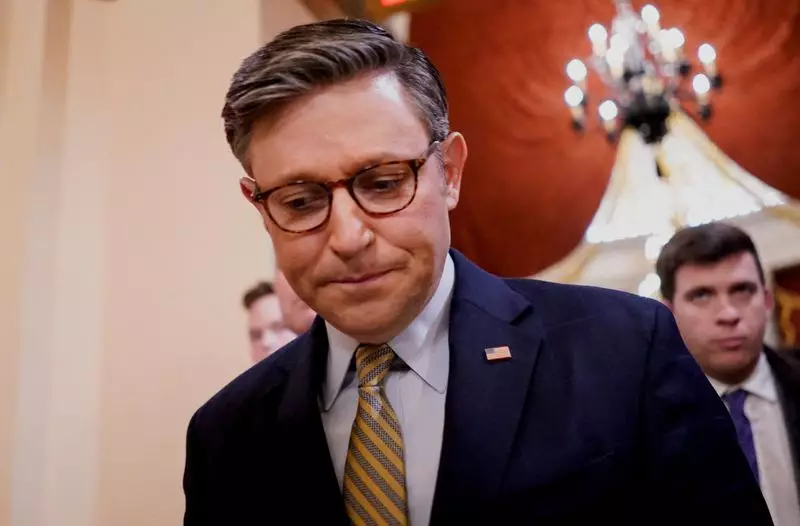The recent vote by the Republican-held U.S. House of Representatives to pass crucial legislation aimed at preventing a government shutdown marks a vital moment in American politics. This development arrives at a time when partisan tensions have reached new heights, exacerbated by the impending transition to a new presidential administration. Knowing the consequences of a government shutdown, lawmakers acted swiftly to ensure continued funding while simultaneously fending off a contentious request from President-elect Donald Trump to raise the debt ceiling.
The legislation in question extends government funding until March 14 and allocates significant aid to disaster-affected states and farmers: $100 billion and $10 billion, respectively. However, it notably does not include provisions for raising the debt ceiling, a proposal that has gained vocal support from Trump, who emphasized the need for the government to access more borrowing capacity before his inauguration. The rejection of the debt ceiling extension highlights a persistent divide within Congress regarding fiscal responsibility.
House Speaker Mike Johnson, who has positioned the Republicans to leverage greater influence in the upcoming legislative session, indicated that this vote serves as a foundational step toward crafting a budget that aligns more closely with Republican priorities. The majority leadership sees the upcoming year as an opportunity to imprint their fiscal strategies, especially when they command majorities across both chambers alongside a Republican president.
Risks of Government Shutdown
Dangers associated with a government shutdown are well-documented, ranging from halted services in law enforcement and national parks to disrupted paychecks for countless federal employees. The looming deadline thrust lawmakers into frantic negotiations as various sectors, including the travel industry, voiced concern that a shutdown could translate into a staggering economic loss, potentially costing the sector $1 billion weekly and leading to chaos during the bustling holiday season. As travelers anticipated lengthy waits at airports, the urgency for bipartisan cooperation grew ever more pressing.
The pathway to passage was not without its complications. Earlier legislative proposals faced backlash, particularly from Trump and influential figures like Elon Musk, who argued that earlier versions were overloaded with extraneous elements. Key provisions, including those intended to limit investments in China, were notably excised, reflecting a strategic recalibration among House Republicans to ensure a more focused legislative agenda.
While Musk may not hold an official governmental role, his sway over budgetary discussions underscores the intricate interplay between private interests and public policy in modern governance. His public approval of the pared-down legislation signals a calculated shift among lawmakers to prioritize essential funding while sidestepping divisive debates that could jeopardize timely passage.
On the Democratic side, House Minority Leader Hakeem Jeffries expressed cautious optimism, acknowledging the bill’s provisions that addressed the immediate needs of American citizens, such as disaster relief, while seeking to assert the party’s resolve in future negotiations on broader fiscal concerns. He positioned the legislation as a necessary compromise, setting the stage for forthcoming battles over budgetary policy and tax reforms.
Unresolved Fiscal Dilemmas
The neglect of the debt ceiling remains a critical issue moving forward, as Congress will need to authorize further borrowing, given the federal government’s substantial debt burden exceeding $36 trillion. Earlier disagreements surrounding debt limitations have historically rattled financial markets, as fears of a government default loom large. With the suspension of the debt ceiling set to end soon, lawmakers will need to find a resolution or face another potential fiscal crisis.
Opponents of the latest legislative move argue that it fails to address the underlying fiscal challenges facing the nation. Representative Rich McCormick, one of the dissenting Republicans, voiced concerns that continuing the status quo might erode the country’s economic future. The lingering questions of fiscal sustainability and economic resilience are sure to dominate discussions among lawmakers as they prepare for the sessions ahead.
The Road Ahead
Overall, the recent bipartisan legislation showcases both the necessity of collaboration and the complexities involved in modern governance. As the implications of this vote unfold, the House may become a battleground for intense negotiations surrounding the debt ceiling and future funding priorities. The focus will undoubtedly remain on how these strategies will impact not just immediate fiscal arrangements, but also the broader trajectory of government spending and economic stability in the months and years to come. As the new administration takes shape under a familiar figure, the ensuing political dynamics will continue to shape this crucial aspect of American policy.

